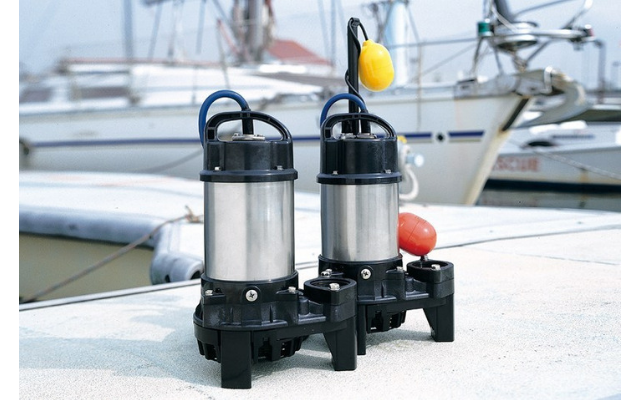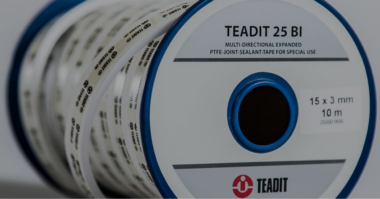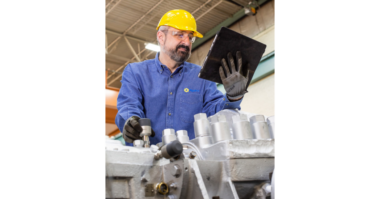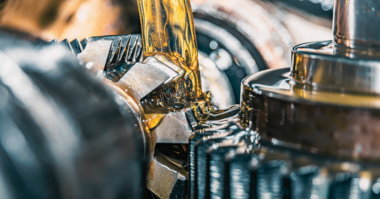Not every pump is right for every application. That’s why it is important to accurately define the specifications of the pumping project before selecting the pump that will operate the most efficiently and will be the most cost-effective. Make sure to understand the environment in which the pump will be operating and don’t rule out new technology as a solution to a problem or to increase service life.
If operations occur in a corrosive or high-chloride environment, a titanium pump may be the best option. Titanium is now being used in the construction of some pumps and can provide significant benefits. Titanium has excellent corrosion resistance, is compatible with high-chloride level environments and has a high strength-to-weight ratio. Titanium is 45 percent lighter than steel and twice as strong as aluminum. Titanium also is able to resist abrasive and chemical cavitation erosion, even in high flow environments.
In contrast, more commonly used stainless steel alloy submersible pumps have more limited pH and chloride level ranges. Stainless steel is also more susceptible to stress corrosion cracking in aggressive environments. These factors lead to reduced pump life, higher maintenance costs and downtime-related revenue losses.
The Pitting Resistance Equivalency Number (PREN) is an accepted measure of an alloy’s suitability for seawater service, with a PREN of 40 being the generally accepted minimum level for corrosion resistance. Only super duplex stainless steels, exotic nickel alloys — including cupronickel — and titanium meet this criteria. Of these materials, only titanium is resistant to all eight modes of corrosion. All others are susceptible to at least crevice corrosion damage.
Despite this and because of their more general availability, austenitic stainless steel pumps are commonly used in seawater applications. In field tests using seawater, crevice corrosion occurred in the austenitic stainless steel motor frame, bolts, nuts and washers after six months of operation. In particular, uniform corrosion caused extreme damage to the motor shaft and crevice corrosion created leakage paths that would allow water intrusion into the motor housing. An identical titanium pump run in parallel had no damage whatsoever.
Protective coatings and sacrificial anodes are also commonly utilized on cast iron and stainless steel submersible pumps. These workarounds are more a stop gap than a solution to increasing pump reliability in challenging applications. Anodes need to be replaced on a regular basis to remain effective. A single scratch in the protective coating provides corrosion a foothold that can spread rather quickly. The best solution is to specify materials of construction (like titanium) that are compatible with the application environment.
Seawater and other high chloride level applications are not the only place where titanium makes sense. It also excels in industrial pumping applications needing to move acidic or chemically aggressive fluids.
A good example of this is mining applications. Many job sites need pumps that can handle highly acidic environments. These include general mine runoff with typical pH values less than 4, sulfuric acid in heap leaching and gold processing with liquid pH levels as low as 0.5.
Titanium pumps have also exhibited long life in the aggressive environments found in landfills and environmental remediation — applications that often have liquids containing a toxic soup of compounds. Titanium pumps have demonstrated a life span 10 times greater than other pumps in the same application, delivering the durability that end users expect.
Titanium pumps are unaffected by most oxidizing acids and industrial chlorine solutions. This characteristic makes them ideally suited for use in manufacturing processes involving chemicals.
While titanium is ideal for seawater and other corrosive environments, it has not seen widespread use because of its higher cost. Even though titanium is the ninth most abundant element and the seventh most abundant metal, it is not found freely in nature but rather is found in other minerals from which it needs to be extracted. It is this extraction that results in its higher costs.
To overcome these cost concerns, pump makers have created designs that capitalize on titanium’s dual properties of material strength and corrosion resistance where they are needed. These include motor housings, motor shafts and fasteners. For other less-strength critical areas, engineered polymer materials can be used. These innovative designs have brought unit costs down and spurred the demand for these unique pumps.
While material selection is crucial in maximizing pump life in aggressive environments, considerations must also be given to the other design aspects that have equal effects on longevity:
Mechanical seal design — Use premium materials, such as silicon carbide for the seal faces. Ensure that all seal faces are cooled and lubricated by a separate oil bath, isolating them from the process fluid and to protect the seal in the event that the pump is run dry. Ideally, the seal design incorporates features to actively lubricate the upper seal — this factor alone can increase seal life by a factor of two to three times.
Cable entry — Ensure that the seal where the power cable enters the motor housing is engineered so that it prevents the migration of process fluid into the motor via wicking. Physical damage that nicks the power cable outer jacket, or unexpected degradation of the jacket material could allow process liquid to wick toward the heat of the motor housing. A cable entry with an anti-wick block will protect the motor from damage and the process from downtime.
Motor thermal protection — The quality of the supplied electrical power cannot be relied on, especially in remote locations or harsh environments. Voltage might be irregular, a leg of the three-phase may be lost. Ensure the pump has an integral thermal device to protect the motor windings from being damaged when the line power is out of tolerance.
Progress in pump design and manufacturing processes have made titanium pumps a viable option. Applications that require long life in corrosive or high chloride environments can take advantage of titanium’s unique material properties to maximize uptime and minimize life cycle costs. Material considerations are critical, but so is a solid mechanical design. Taking a comprehensive approach in selecting pumps for harsh applications will significantly increase the chances for success.
About the Author
Douglas Chappel has been the southeast regional manager at Tsurumi Pump since 2017, managing distribution channels throughout the region and providing his expertise in providing innovative solutions to challenging applications. Chappel has more than 25 years of experience in the areas of pumping equipment, fluid systems, industrial controls, remote monitoring, cloud-based SCADA, IIoT and high-speed rotating machinery. His career began in the aerospace and industrial gas and steam turbine industries where he became a recognized expert in secondary air fluid systems and sealing technologies. Previously, Chappel served as managing principal at Landmarc Environmental Systems for five years and after having founded Lucas Technologies and Sligo Systems. Chappel holds a bachelor’s degree in mechanical engineering from the University of Connecticut.




